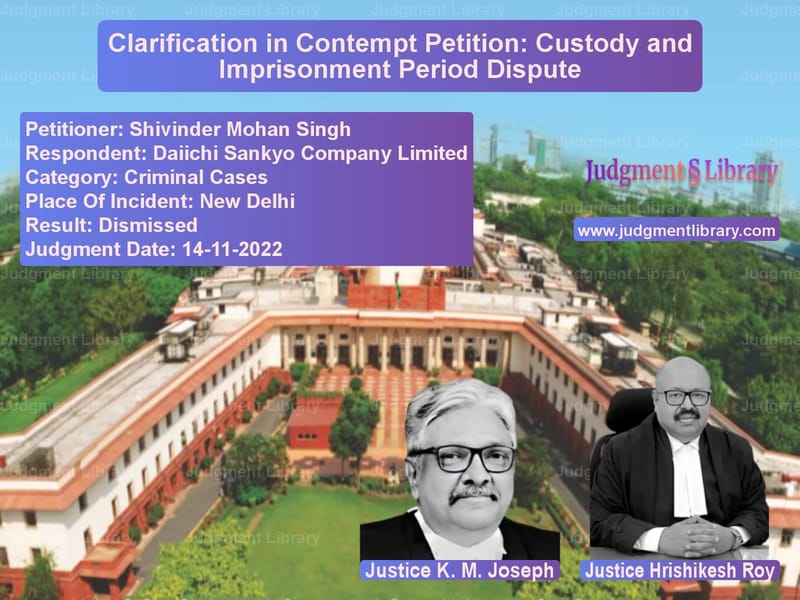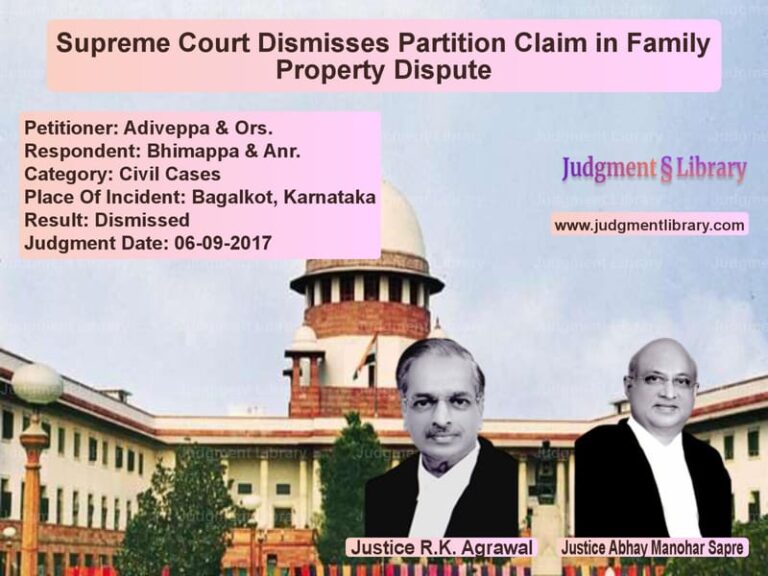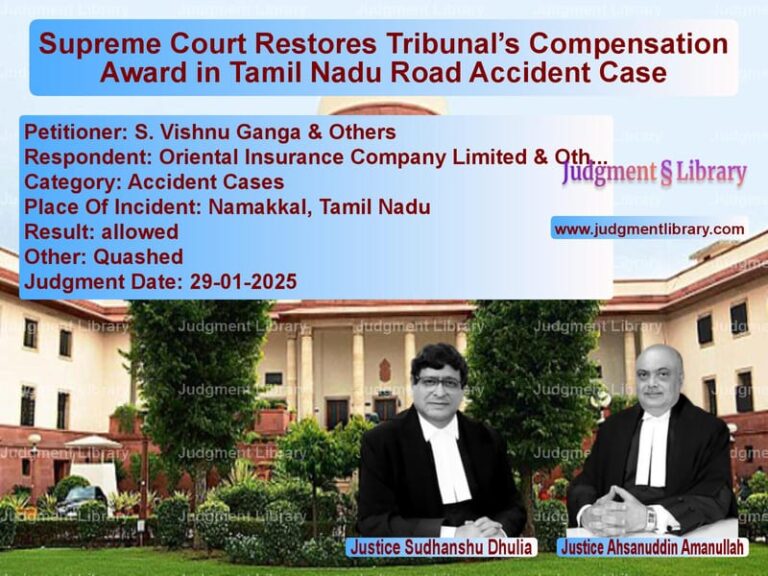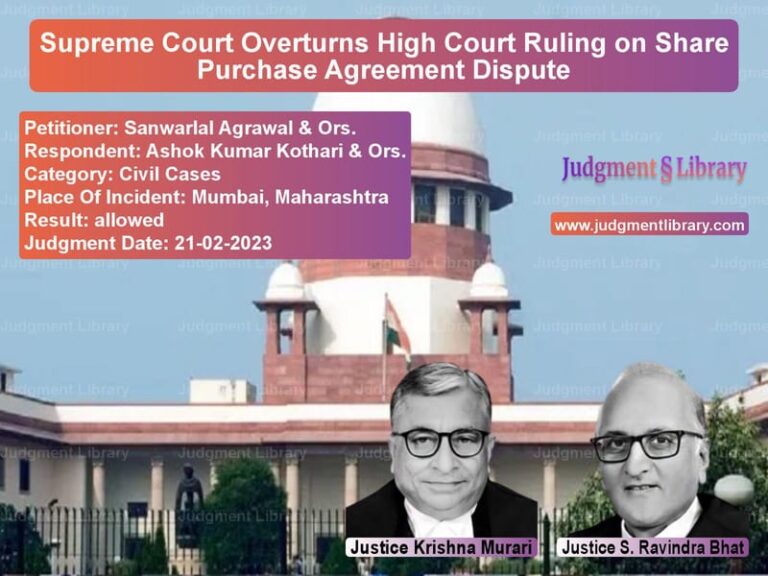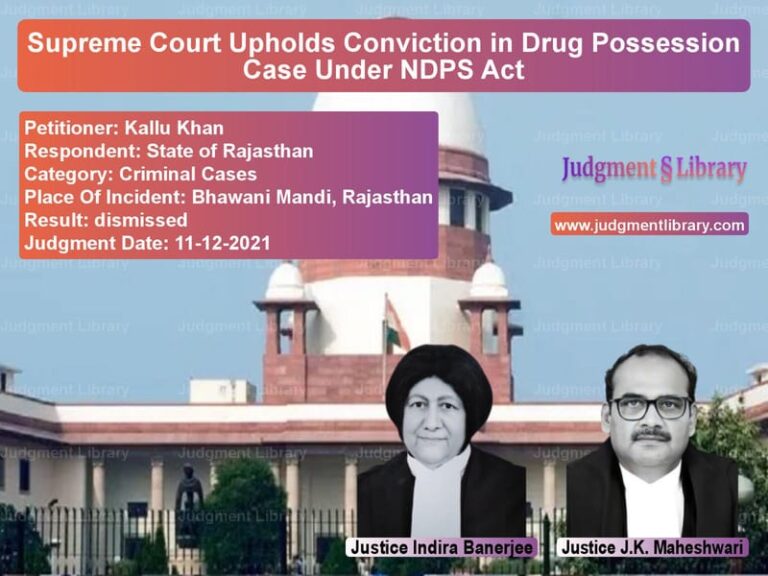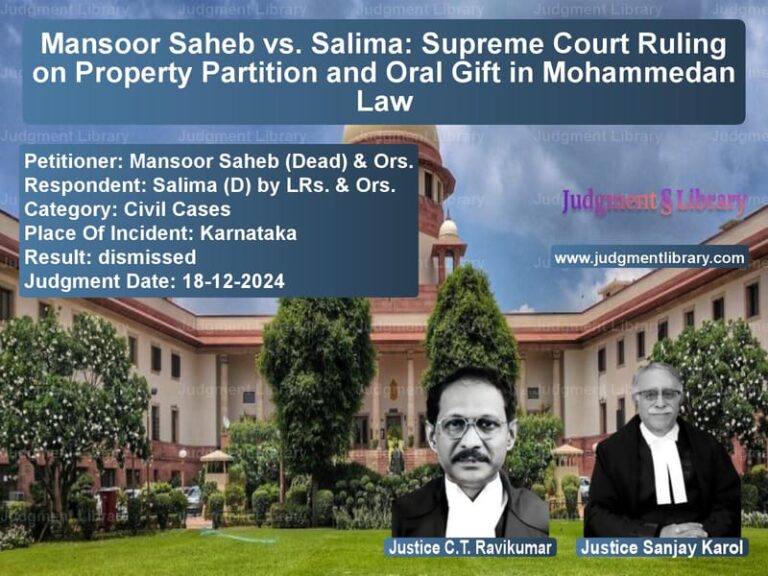Clarification in Contempt Petition: Custody and Imprisonment Period Dispute
This judgment involves a Miscellaneous Application filed by Dr. Shivinder Mohan Singh in the context of a contempt petition concerning the violation of court orders. The applicant, in this case, sought clarification regarding the commencement of his six-month imprisonment sentence, which was passed in September 2022. The applicant argued that his term should be considered to have started earlier, in February 2020, based on the fact that he had been in continuous custody from that time. The court, however, dismissed the application, holding that the period of imprisonment should commence from the date of the order in September 2022.
The matter began with a contempt petition filed in 2018, and the initial issue revolved around the failure of the Singh brothers, including the applicant, to comply with court orders. The court had previously directed them to deposit a substantial sum of money as a means of purging their contempt, but the applicant did not comply, which led to his conviction and the imposition of the six-month sentence.
The court had granted the applicant an opportunity to purge himself of the contempt but eventually sentenced him in September 2022. In his present application, the applicant sought to have his term of imprisonment treated as commencing from his custody in February 2020, arguing that he had been in continuous custody since that time.
Read also: https://judgmentlibrary.com/supreme-court-restores-bail-for-accused-in-dowry-death-case/
Ms. Meenakshi Arora, the senior counsel for the applicant, cited Section 428 of the Criminal Procedure Code (Cr.P.C.), which allows for the period of detention undergone during the investigation, inquiry, or trial to be set off against the sentence. She contended that the applicant’s detention from February 2020 should be counted towards his sentence, as he had not been released on bail and had been in custody during that period. The applicant’s counsel also referred to the judgment in State of Maharashtra vs. Najakat Alia Mubarak Ali and Niranjan Singh vs. Prabhakar Rajaram Kharote, arguing that the applicant should be treated as being in custody from February 2020.
On the other hand, Mr. Rajiv Dutta, the senior counsel for the non-applicant, opposed this contention, stating that the applicant’s appearance in court in February 2020 was not in connection with the contempt case, but for the purpose of purging himself of the contempt. He argued that the applicant’s detention in another case could not be counted towards the contempt case sentence.
The court carefully considered the arguments presented. It noted that Section 428 of the Cr.P.C. applies when a person is in custody in connection with the same case for which they are later convicted. In the applicant’s case, although he had been in custody since February 2020, it was in connection with another case, not the contempt case. Therefore, the court ruled that the period of imprisonment would start from the date of the contempt order in September 2022, as it was not connected to the applicant’s earlier detention.
The bench of Justice K. M. Joseph and Justice Hrishikesh Roy concluded that the applicant’s plea for clarification was without merit. They emphasized that the applicant’s continued custody in a separate case could not be counted as serving the sentence for the contempt of court case. The application for clarification was therefore dismissed.
Read also: https://judgmentlibrary.com/supreme-court-acquits-protestors-in-kerala-public-property-damage-case/
This case highlights important aspects of contempt proceedings, especially the complexities related to the calculation of the imprisonment term in cases where the contemnor is already in custody for another matter. It also underscores the interpretation of custody and how the law sets off periods of detention against sentences under specific circumstances.
Background and History of the Case
The contempt petition filed in 2018 became a pivotal moment for the Singh brothers, who had been at the center of financial and corporate controversies, specifically involving the companies RHC Holding Pvt. Ltd. and Oscar Investments Ltd. The case escalated when they failed to comply with court orders, and the judiciary deemed their actions to be willfully in contempt. The court had previously given them an opportunity to comply with the orders, but when they did not, the legal repercussions became severe.
Both the Singh brothers, Malvinder Mohan Singh and Shivinder Mohan Singh, had been facing legal challenges for some time, and their disregard for court orders in this matter led to their conviction. The contempt proceedings were one of the several ongoing cases involving the brothers, and the judicial system sought to address not only the failure to comply with the specific orders but also to establish a precedent for enforcing legal accountability.
The fact that the applicant had been in custody from February 2020 onwards played a critical role in the present clarification application. The applicant’s legal counsel argued that his client had already undergone more than 30 months in custody by the time the September 2022 order was passed. The plea for a reduced sentence was based on the assertion that the applicant had already suffered significant hardship during his incarceration. However, the court maintained that the issue was not merely about the time spent in custody but about the specific terms of the sentence and whether those terms could be adjusted based on time served in other legal matters.
The Legal Argumentation: Section 428 Cr.P.C. and Its Relevance
One of the core issues in this case was the application of Section 428 of the Criminal Procedure Code (Cr.P.C.), which deals with the adjustment of detention time against a sentence of imprisonment. This provision allows for the time spent in custody before conviction to be subtracted from the final sentence imposed by the court. However, for this provision to apply, certain conditions must be met.
The applicant’s counsel, Ms. Meenakshi Arora, argued that since the applicant had been in custody since February 2020 and had not been granted bail, the period of his detention should count towards the six-month sentence he was later sentenced to. The argument was based on a reading of the law that suggested any detention, whether or not directly linked to the current case, could be set off against the sentence if the person was not released from custody.
However, the court disagreed with this interpretation. The bench emphasized that Section 428 Cr.P.C. was designed to apply to situations where the detention was directly related to the case at hand. In the present case, the applicant was not in custody specifically for the contempt proceedings but for another matter entirely. Therefore, the court held that the detention in the other case could not be set off against the contempt sentence.
The Court’s Interpretation of Custody
Another significant issue addressed in this case was the definition of custody and when a person can be considered to be “in custody” for the purposes of sentencing. The applicant’s counsel relied heavily on a previous ruling by the Supreme Court in Niranjan Singh vs. Prabhakar Rajaram Kharote, which discussed when a person can be said to be in custody under the law. The case provided clarity on the fact that a person is in custody when they submit to the jurisdiction of the court, either by being physically detained or by voluntarily surrendering to the court’s authority.
The applicant argued that by being produced before the court in February 2020, he had effectively submitted to the court’s jurisdiction and should therefore be treated as being in custody for the purposes of the contempt case. However, the court rejected this argument, clarifying that his production in court was for the purpose of affording him an opportunity to purge himself of contempt, not to serve a sentence in connection with the contempt case.
Ultimately, the court maintained that custody, for the purposes of contempt, must be related to the specific legal matter. The detention in another case did not qualify as serving the contempt sentence, and therefore, the time spent in custody was not eligible to be deducted from the six-month term of imprisonment imposed in September 2022.
Final Decision and Conclusion
In conclusion, the Supreme Court dismissed the applicant’s plea for clarification. It emphasized the importance of adhering to the terms set forth in the September 2022 order and maintained that the applicant’s detention in another case could not be treated as part of the sentence for contempt of court. The court upheld the clarity of its earlier order, and the applicant’s sentence began from the date specified in the original ruling.
This case serves as a reminder of the complexities of contempt proceedings, particularly when a contemnor is already involved in other legal matters. The court’s decision highlights the importance of distinguishing between the various types of custody and the need for clear legal interpretations when dealing with the enforcement of court orders.
Petitioner Name: Shivinder Mohan Singh.Respondent Name: Daiichi Sankyo Company Limited.Judgment By: Justice K. M. Joseph, Justice Hrishikesh Roy.Place Of Incident: New Delhi.Judgment Date: 14-11-2022.
Don’t miss out on the full details! Download the complete judgment in PDF format below and gain valuable insights instantly!
Download Judgment: shivinder-mohan-sing-vs-daiichi-sankyo-compa-supreme-court-of-india-judgment-dated-14-11-2022.pdf
Directly Download Judgment: Directly download this Judgment
See all petitions in Contempt Of Court cases
See all petitions in Other Cases
See all petitions in Judgment by K.M. Joseph
See all petitions in Judgment by Hrishikesh Roy
See all petitions in dismissed
See all petitions in supreme court of India judgments November 2022
See all petitions in 2022 judgments
See all posts in Criminal Cases Category
See all allowed petitions in Criminal Cases Category
See all Dismissed petitions in Criminal Cases Category
See all partially allowed petitions in Criminal Cases Category

